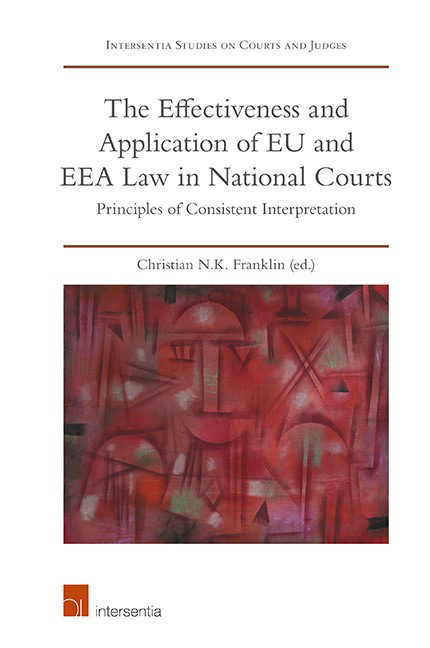 The Effectiveness and Application of EU and EEA Law in National Courts
The Effectiveness and Application of EU and EEA Law in National Courts Norway
Published online by Cambridge University Press: 31 January 2019
Summary
INTRODUCTION
This contribution will look at how courts in Norway approach and apply the European Economic Area (EEA) principle of consistent interpretation – or at least something which looks like it – in practice. As will be shown, although there may be many similarities to the way in which national courts in the European Union (EU) Member States deal with such issues, there are also a number of peculiarities. Where some of these may be seen as connected to idiosyncrasies of the Norwegian legal culture, others may relate more to the particular nature of EEA law. After providing some important background information on Norway ‘ s legal system and its EEA context, and also looking at the methods applied in collecting the data used (section 2), this contribution will proceed to show how Norwegian courts generally seem to have received and understand the concept of consistent interpretation (section 3), the scope and criteria for its application (section 4) and its limits (section 5). Some concluding remarks will be provided at the end, to sum up the various findings (section 6).
METHOD AND BACKGROUND
Norway is a constitutional monarchy, with a democratic, representative parliamentary form of government. A relatively small country on a European scale, with a population of around 5.2 million people, it is nevertheless the largest of the three European Free Trade Association (EFTA) States party to the EEA Agreement, which allows Norway, Iceland and Lichtenstein to participate in the EU internal market. Access to the internal market afforded to the EFTA States nevertheless comes at a price: EEA law must keep up to speed with developments in EU law. In light of the constantly evolving nature of EU law, certain mechanisms have therefore proven essential in seeking to ensure that EEA law has been developed dynamically in line with EU law. Key above all was the insertion of the fundamental principle of homogeneity into the Agreement, requiring the Contracting Parties (i.e. the EU and its institutions, the EU Member States and the EFTA States) to strive to ensure that identical rules under EU and EEA law are interpreted and applied in a uniform manner, on the basis of equality and reciprocity.
- Type
- Chapter
- Information
- The Effectiveness and Application of EU and EEA Law in National CourtsPrinciples of Consistent Interpretation, pp. 317 - 362Publisher: IntersentiaPrint publication year: 2018


